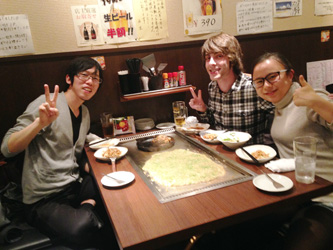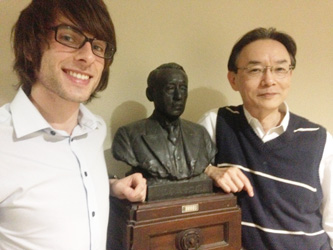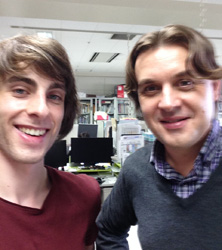Clinical Exchange in Japan
Welcome to Japan and Nagoya University school of Medicine!
Experience Report
Ronan McLellan from University of Edinburgh, UK
Period:2015/10/26 – 11/15
Department: Psychiatry
Whilst some of my peers may have had a difficult time deciding where to go on elective, I had no qualms about where I would go. As a result of my previous educational visit to Japan in 2014, I knew that a second elective at Nagoya University was the right choice for me.
As per my previous visit, the staff at the Office of International Affairs ensured that I was able to get my clerkship off to a good start. They collected me from the hospital and gave me a tour of the site. This was of paramount importance as I would later make my own way to clinics (and, due to the size of the hospital, would have certainly got lost had they not shown me where to go!) Furthermore they ensured that I was informed of all deadlines and set me up with necessary paper work (including a schedule) and a Wi-Fi connection, so that I could start to work on campus. They later facilitated an introductory meeting with some of the psychiatry department staff - a good ice breaker, which helped me to build rapport with key personnel in the department. This was really useful as the prospect of making introductions whilst jetlagged would have been difficult for me to do alone!
The psychiatry staff were welcoming and showed me around the department. Attending a departmental meeting in the evening allowed me to formally reintroduce myself to the entire team and this was a good way to meet new staff members (and to practice some basic Japanese!) In this way, I felt that I was able to quickly become integrated into the team and the staff were keen to help me in any way – including Japanese practice. During my attachment, I was fortunate enough to see psychiatry practiced in a variety of settings: out-patient clinics, in-patient assessments and ward rounds. This variety allowed me to examine the nuances of psychiatry, and the healthcare system, in Japan.
Whilst I saw many consultations during my time at the university, a few cases still stand out in my mind. I saw a patient presenting for the first time with a suspected episode of mania. Despite my rudimentary Japanese, I was able to appreciate that the patient exhibited pressure of speech and restlessness (due to an abundance of energy perhaps?). Indeed in the presence of the patient I felt energetic myself. Whilst the patient clearly needed treatment, they refused to be admitted. Due to the patient’s mental capacity the doctor legally had to accept this decision despite the prospect of the patient’s mental state declining. However, due to input from family members, the patient changed their decision and was subsequently admitted. This reminded me of the importance of family in influencing healthcare needs and treatment decisions, as is often seen in the UK, and highlighted the importance of including the whole family when deciding upon the best treatment. Furthermore, this case highlighted the importance of having an ethical code of conduct to guide treatment policy – as is also the case in the UK. By observing this patient’s transition from initial assessment to inpatient stay, I was able to understand the patient experience of the Japanese healthcare system.
One of the main benefits of studying psychiatry in Japan, for me, was the opportunity to hone my clinical observation skills. In bedside learning, we are taught to observe and make a brief assessment of the patient on approach and before talking to them. During my time in Japan I had to rely more heavily upon this skill as I could not fully understand the patient due to the language barrier. Indeed, I witnessed one patient fail to respond to a doctor’s line of questioning , and instead talked to the space around themselves. Conducting a mental state exam, it was clear that the patient was experiencing auditory hallucinations . Talking with the doctor afterwards confirmed this. I later saw many patients exhibiting different traits: poverty of speech, poor eye contact and lethargy ( depression);aggressive and uncontrollable (ADHD);abnormal social skills and repetitive movements (ASD). Indeed my time in clinics allowed me to develop my observation skills and mental state exam – key skills for any medical student or doctor. Whilst the language barrier was apparent, it did not reduce the usefulness of my experience and instead encouraged me to develop other skills, particularly observation. Furthermore, I was able to see the effect of culture on healthcare. For example, in the UK, plants are popular gifts to give in-patients. During hospital ward rounds, however, I saw that few patients had potted plants by their bedside. The reasoning for this, I was told, was because potted plants have roots – and giving this as a gift would result in the intended recipient growing roots and failing to recover. As a result of this belief, patients only received cut flowers.
My learning was not confined to clinical psychiatry as I was able to attend weekly group discussions regarding psychiatric research. In this way, I was able to keep abreast of developments in new treatments for psychiatric diseases and develop a better understanding of psychiatric diseases at a molecular level e.g. I learned of treatments being developed to overcome social difficulties in autistic patients. One drug being tested is oxytocin. I also learned about the risk factors for autism development such as the broader autism phenotype (BAP). To help with these discussions, I was tasked to review research papers and critically appraise them. This helped me evaluate the usefulness of the presented evidence and this made participating in discussions more fruitful. As I do not get regular opportunities to be involved in academic medicine, I found these experiences a useful in helping develop my critical appraisal skills.
Out-with the psychiatry department, I was given the opportunity to sit in with a clinical psychologist with palliative patients. In this way, multi-disciplinary team working could be observed. Outside the hospital, I was able to take advantage of on-site Japanese lessons which helped me to improve my conversation skills. This helped me to gleam the most of patient consultations.
My friends who have studied abroad have often complained of feeling isolated. During my time at Nagoya, this was definitely not the case for me. The staff and students in the department were very proactive and often took me out in the evenings to try local cuisine (I’d recommend monja-yaki!)They also advised on places to go and helped me avoid cultural faux-pas. The university also has an exchange group for local and international students - the Medei Exchange Club (MDEC). This allowed me to meet many students from both Japan, Asia and Europe. From a healthcare perspective, talking to other students helped me gain insight into the process of studying and practicing medicine in foreign countries, and also the problems rife within each population (in contrast to the West, smoking is still a major problem). Additionally, it gave me a chance to socialise and make new friends! In this way, I was given the opportunity to visit places in the greater Aichi area – such as Inuyama (famous for its temples) and Himakajima island (famous for the octopus-based dish, takoyaki, and for fugu (blowfish). Definitely memorable experiences and some which have given me insight into the workings of the Japanese lifestyle.
In summary, my time at Nagoya University was fruitful and I was able to expand upon my previous knowledge of psychiatry, medical practice and Japanese lifestyle. I have also been able to improve my observational, critical appraisal and communication skills. By comparing the differences (and similarities) between the UK and Japan I feel I have a grasp of how culture influences medical practice. I would recommend this experience to any student remotely interested in psychiatry or with an interest in the influence of culture on healthcare provision. Whilst fluency in Japanese is not required, I feel that it would help make the most of a psychiatry placement (due to the conversation-heavy nature of assessment). However, as I have shown here, you can plenty with just a basic understanding of Japanese. The fact that I have undertaken this placement twice is proof of that. I would like to thank Prof Ozaki, Prof Aleksic, the staff and students of the psychiatry department, and the staff of the office of international affairs, for making my placement useful, educational and -crucially – fun.



Click here to read other stories
Nagoya University Graduate School of Medicine